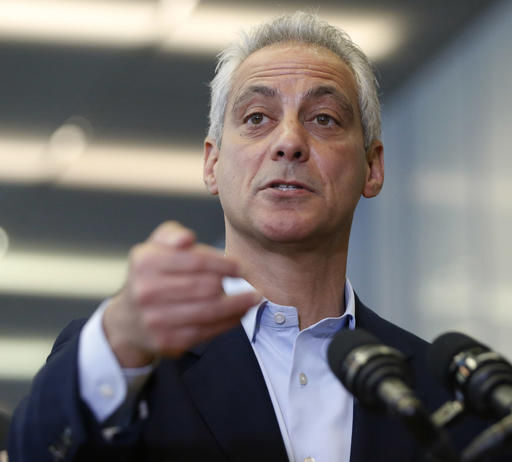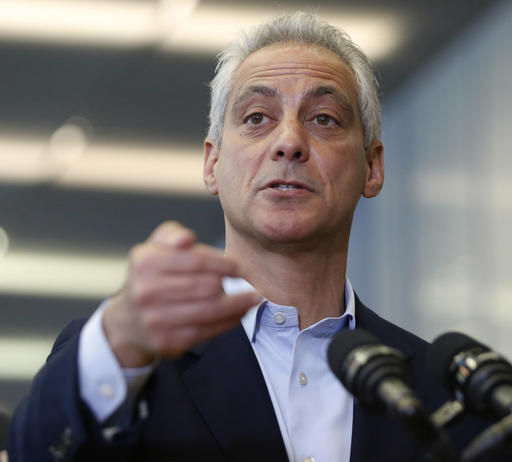America is in crisis. Rahm Emanuel says don’t waste it.

Chicago Mayor Rahm Emanuel responds to a question in 2016 during a news conference in Chicago.
Associated Press File Photo
CARBONDALE — Rahm Emanuel, a former mayor of Chicago, congressman and Obama White House chief of staff, said his infamous line about never wasting a crisis has followed his “sorry little tush all over.”
He made the statement at a conference as Obama transitioned into the White House, though clarified that what he actually said was something more along the lines of, “Never allow a good crisis to go to waste. It’s the opportunity to do the big things you never thought possible and make them possible.” During a virtual public forum Thursday morning hosted by the Southern Illinois University Paul Simon Public Policy Institute, Emanuel said he believes that statement holds true. The economic, health and social justice crises playing out across America make this a ripe time to push big policies aimed at creating a more equitable society, he said in a conversation with Simon Institute Executive Director John Shaw.
“Here’s how I look at this. You have a 100-year pandemic, a 75-year economic depression and a 50-year civil and racial unrest,” Emanuel said. “I don’t think any of ‘em are President Trump’s fault, but I think he has exacerbated and made every one of ‘em worse by his response. I think it’s naturally an opportunity … to redo things and think about things in a more inclusive way.”
Emanuel’s talk centered on the growing role of mayors in American politics, which is the focus of a new book he released earlier this year titled “The Nation City: Why Mayors Are Now Running the World.” Emanuel argues in the book that cities and their leaders are responsible for driving innovative U.S. and global policy more so than federal governments.
Much of his talk focused on the ways mayors coordinate across major urban centers, but Emanuel also said he wanted to take the time to address the civil unrest that has resulted in protests and demonstrations in communities across America — big and small — in the wake of the violent killing of George Floyd, an African American man who died in police custody after a white officer kneeled on his neck for nearly nine minutes.
The events that unfolded once again put the spotlight on police and community relations, Emanuel said, “but also — and of equal value, an exclusionary economic model that has run its course.”
Learning, he said, is the key to economic prosperity, for individuals and communities. But not everyone has equal access to education, he noted.
Across the globe in the industrialized world, Emanuel said that the “last 30 years have been an incredible period of time, but an incredible period of time for very few people. And if we don’t figure out a model that gets more people in the winner’s circle, this game is up.”
As an example, one policy change Emanuel is advocating for is a federal takeover of Medicaid and unemployment insurance, which now operate as federal-state partnerships. He argues that doing so would allow for a modernization of the programs while saving states $250 billion that they could reinvest in education — including universal, full day pre-K and free community college — as well as infrastructure improvements.
Emanuel also encouraged SIU students who joined the Zoom call for his talk to take an active role in their communities in the years ahead.
“I ask all the students that are on this, to spend a part of your life intellectually, personally, figuring out how to change the policies, the politics in your community to a more inclusive model,” he said.
Emanuel’s virtual public forum was part of the Simon Institute’s “Understanding Our New World” series in which Shaw has invited numerous guests, including historians, political analysts, journalists, politicians, educational leaders and others, to discuss the various effects of the COVID-19 pandemic on the world.
To date, in addition to Emanuel, he has hosted David Kennedy, a Pulitzer Prize-winning historian from Stanford University; Jan Eliasson, former deputy secretary general of the United Nations and former Swedish foreign minister; Knox College President Teresa Amott; and New York Times Washington chief correspondent Carl Hulse. Upcoming talks include Illinois U.S. Rep. Darin LaHood on June 8; state Rep. Emanuel “Chris” Welch on June 11; and William Burns, president of the Carnegie Endowment for International Peace, on June 18.
Into the future, Shaw said the plan is to host conversations twice monthly through year’s end, with an emphasis on seeking wide-ranging and diverse voices to help provide perspective in these uncertain times.
“The world seems to be shifting under our feet and all of us are trying to understand what is happening and how our lives will be different in the future,” Shaw said. “The Institute had decided to reach out to compelling leaders and analysts from across the world, throughout the United States, and in Illinois to help us see what challenges and opportunities await us.”











